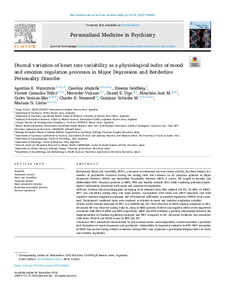Please use this identifier to cite or link to this item:
https://repositorio.uca.edu.ar/handle/123456789/14232| Título: | Diurnal variation of heart rate variability as a physiological index of mood and emotion regulation processes in major depression and borderline personality disorder | Autor: | Wainsztein, Agustina E. Abulafia, Carolina Andrea Goldberg, Ximena Camacho-Téllez, Vicente Vulcano, Mercedes Vigo, Daniel Eduardo Menchón, José M. Soriano-Mas, Carles Nemeroff, Charles B. Guinjoan, Salvador M. Castro, Mariana N. |
Palabras clave: | EMOCIONES; RITMO CIRCADIANO; RITMO CARDIACO; DEPRESION; PERSONALIDAD | Fecha de publicación: | 2020 | Editorial: | Elsevier | Cita: | Wainsztein, A.E., et al. Diurnal variation of heart rate variability as a physiological index of mood and emotion regulation processes in major depression and borderline personality disorder [en línea]. Personalized Medicine in Psychiatry. 2020, 23-24 doi:10.1016/j.pmip.2020.100065 Disponible en: https://repositorio.uca.edu.ar/handle/123456789/14232 | Resumen: | Abstract: Background: Heart rate variability (HRV), a measure of autonomic nervous system activity, has been studied in a number of psychiatric disorders during the resting state but evidence on its circadian patterns in Major Depressive Disorder (MDD) and Borderline Personality Disorder (BPD) is scarce. We sought to identify and differentiate HRV circadian patterns in MDD, BPD and healthy controls (HC) while exploring potential physiological mechanisms associated with mood and emotion dysregulation. Methods: 24-Hour electrocardiographic recordings were obtained from fifty subjects (16 HC, 18 BPD, 16 MDD). HRV was calculated during sleep and wake periods. Associations with mood and affect measures, and with cognitive emotion regulation strategies and self-reported difficulties in emotion regulation (DERS) were examined. Participant’s resilience traits were explored in relation to mood and emotion regulation variables. Results: Lower diurnal measures of HRV (i.e, RMSSD and HF) were observed in MDD subjects compared to HCs. Decreased HF was observed during wake vs. sleep in MDD patients. HAM-D and negative affect scores negatively correlated with HRV in MDD and BPD respectively. MDD and BPD exhibited a positive relationship between the implementation of emotion regulation strategies and HRV compared to HC. Increased resilience was associated with lower HAM-D and DERS scores in BPD and HC. Conclusion: HRV alterations characterized by low diurnal cardiac parasympathetic control constitute a potential trait biomarker of major depression and psychiatric vulnerability to depressive episodes in BPD. HRV anomalies in MDD may persist during clinical remission. Diurnal HRV may represent a psychophysiological index of mood and emotion regulation. | URI: | https://repositorio.uca.edu.ar/handle/123456789/14232 | ISSN: | 2468-1717 | Disciplina: | MEDICINA | DOI: | 10.1016/j.pmip.2020.100065 | Derechos: | info:eu-repo/semantics/closedAccess | Fuente: | Personalized Medicine in Psychiatry. 2020, 23-24 |
| Appears in Collections: | Artículos |
Files in This Item:
| File | Description | Size | Format | |
|---|---|---|---|---|
| THUMB.pdf | 254,95 kB | Adobe PDF |  View/Open | |
| diurnal-variation-heart-rate.pdf | 1,78 MB | Adobe PDF | Request a copy |
Page view(s)
97
checked on Apr 27, 2024
Download(s)
63
checked on Apr 27, 2024
Google ScholarTM
Check
Altmetric
Altmetric
This item is licensed under a Creative Commons License

